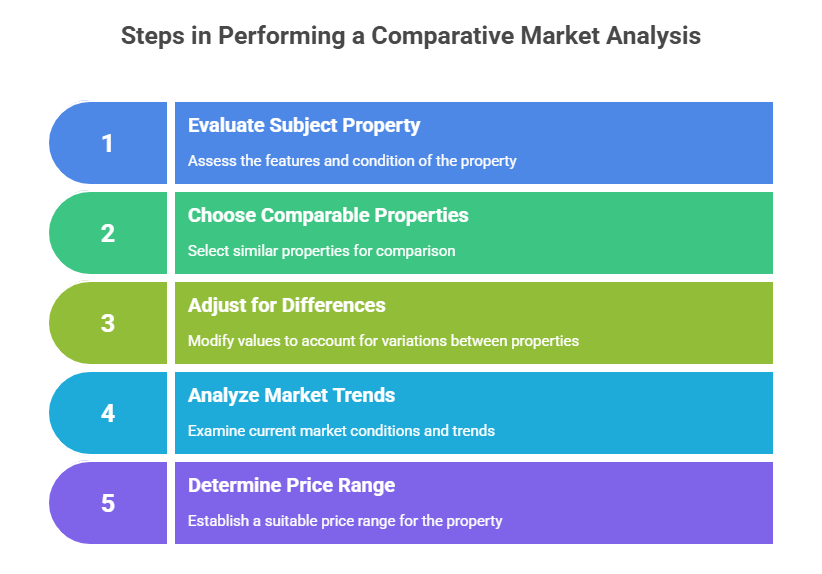When you’re in the real estate market looking to buy or sell your home, you go through a series of challenges.
For starters, people generally have no idea how much to ask or offer for a property, and think, ‘how much is my home worth?’
That’s where a Comparative Market Analysis becomes essential. Given how many factors influence a property’s value, using a comparative market analysis real estate report helps ensure you price it accurately based on current market conditions.
What is Comparative Market Analysis (CMA)?
CMA is a method used by real estate brokers to assess the price of a particular home by comparing it to similar properties that have previously sold in the same region.
A CMA is extremely useful in today’s changing real estate market. It offers a market overview that reflects current trends and previous transactions in a similar area. This further helps in predicting future market behavior while buying and selling properties.
When and Why Do You Need A CMA?
A Comparative Market Analysis (CMA) is a powerful tool that helps you make smarter decisions. Here’s when and why a CMA really matters:
Selling a Home: Pricing It Right:
Overpricing or underpricing their property is one of the biggest mistakes when you plan to sell your house in Nashville, TN. Having a CMA helps you understand what similar homes in their area have recently sold for, which in turn helps you set a competitive and realistic price.
Buying A Home: Understanding Fair Value:
As a buyer, you want to ensure you’re not overpaying. Thanks to a CMA, you can now evaluate the asking price of a home by comparing it with recently sold properties in the same neighborhood. It helps you invest in properties at their fair price, not market hype.
Refinancing or Investing:
Planning to refinance? Your lender will want to know your home’s value. Getting a CMA helps you get a solid estimate, which can help you understand how much equity you’ve built and what loan terms you might qualify for.
Pre-Listing Preparation:
You need a CMA even before you put your home on the market. It gives you insight into what buyers in your area are looking for and what they’re willing to pay. This can guide your renovation decisions, staging strategy, and even timing. A CMA helps you enter the market prepared and with realistic expectations.
Competitive Market Pricing:
In a fast-moving or highly competitive market, pricing strategy can make or break a sale. A CMA ensures your listing stands out without pricing yourself out of buyer interest.
What Data Is Included in A CMA?
When putting together a Comparative Market Analysis (CMA), real estate agents don’t just guess a number like in the case of a home value estimator. They compile a range of data points to create a clear picture of a home’s actual value.
Here’s what typically goes into the mix:
- Recently sold homes (comps): Data on the homes sold in your vicinity. It gives a clear idea of the ideal market value.
- Active listings: The number of similar properties on the market. Such data helps you get an insight into the competition.
- Pending sales: Data on pending sales shows the money buyers are agreeing to pay, even if the deals haven’t closed yet.
- Expired listings: Expired listings can reveal the factors behind why homes didn’t sell. It provides insight into whether the price was too high or the market was too slow.
- Home details: It includes every aspect of the house, including bedrooms, bathrooms, square footage, age, location, and overall condition.
- Price per square foot: Another useful metric, price per sq. foot, helps compare homes of different sizes in the same area.
All of this helps ensure the pricing is grounded in reality, not guesswork.
How Real Estate Agents Perform A CMA (Step-by-Step):

Step 1: Evaluate the subject property
Agents start by creating a detailed database of your property. They examine various aspects of ownership, including permits and taxes, through local government administrative offices.
Here is some information that they evaluate for subject properties:
- Year built
- Evaluation of interior finishes
- Location details
- Acreage of the lot
- The amenities in the property
- Square footage
- Number of bedrooms and bathrooms
- Details of the improvements done
Once the local real estate agent in Nashville, TN, has the required information, it’s time to compare against properties.
Step 2: Choose comparable properties
In the next step, your agent will prepare four to six comparable properties (comps). It helps them lay out an estimate of the market value of a property.
Here are the criteria agents consider during comps:
- Sold within three months to one year from the current date
- Located in a similar location or neighborhood
- Performs well with a short listing-to-closing window
Additionally, they conduct a thorough analysis of active listings to gain a clear insight into buyer behavior and trends.
Step 3: Adjust for differences
No two homes are exactly alike, even if they’re on the same street. Agents adjust the value of comps to account for differences in size, upgrades, condition, or features.
For example, when buying a house in Nashville, TN, the value of a home with a renovated kitchen or a larger backyard might be worth more than a similar one without those updates. These adjustments help fine-tune the estimated value of the subject property.
Step 4: Analyze market trends
Next, agents consider the current real estate market conditions.
- Is it a buyer’s market or a seller’s market?
- Are homes selling quickly or sitting for months?
They also look at pricing trends over the past few months to understand whether home values are rising, falling, or staying steady. This broader context helps shape a more realistic and timely valuation.
Step 5: Determine a price range or estimate
Finally, it’s time to combine the information for a price range or estimated value. Rather than offering one fixed number, most CMAs give a range to reflect market variability. This helps clients make informed decisions whether they’re buying, selling, or investing.
CMA vs. Appraisal – What’s the Difference?
Although CMAs and appraisals aim to determine a property’s value, they are different in significant ways.
Role of CMA in Property Valuation
A CMA is a tool real estate agents use to help clients understand the market value of a property. It is based on market data and the agent’s expertise.
Compared with Professional Appraisals
An appraisal is a more formal, in-depth valuation conducted by a licensed appraiser. Lenders often require it before they approve a mortgage loan. Assessments are more detailed and are considered more reliable than CMAs.
Legal Implications and Use Cases
Appraisals are legally recognized and often required in transactions like refinancing or home sales involving a loan. CMAs, on the other hand, are informal and used mainly to guide pricing decisions.
Cost and Formal Process
CMAs are typically free and part of an agent’s service. Appraisals involve a fee and follow a standardized process carried out by a certified professional.
How A CMA Helps You Buy or Sell With Confidence
Getting a CMA done for your property helps you avoid the confusion and take steps with proper calculations. Once you have the reports, here are the advantages you’ll have:
- Better negotiation power: Knowing the fair value of the property gives you a negotiation tool. You can bid for the exact price at which a property should be sold.
- Avoiding overpricing/underpricing: Overpricing or underpricing is challenging, especially after you realize it. Getting a CMA helps you avoid the situation from the beginning.
- Speeding up the transaction process: Knowing the accurate numbers also helps improve the overall speed of your transaction. You can settle things at the earliest.
Ready to understand the fair value of your property? Connect with a free CMA with our trusted Zivak Realty Group agents today.
Remember, professionals in the field give you a closer, far more accurate value than other individuals. All the best!




